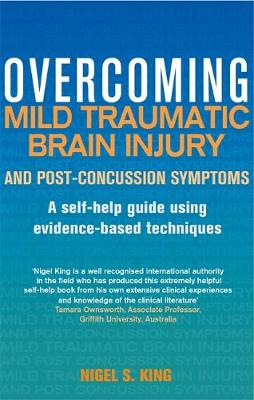21%OFF

Stock image for illustration purposes only - book cover, edition or condition may vary.
Overcoming Mild Traumatic Brain Injury and Post-Concussion Symptoms: A self-help guide using evidence-based techniques
Nigel King
€ 16.99
€ 13.37
FREE Delivery in Ireland
Description for Overcoming Mild Traumatic Brain Injury and Post-Concussion Symptoms: A self-help guide using evidence-based techniques
Paperback. A new title for the Overcoming series that gives guidance on managing post-concussion symptoms after a mild traumatic brain inury. Num Pages: 240 pages, 20 b/w integrated illustrations. Included with text. Need redrawing. BIC Classification: MJN; VFJB. Category: (G) General (US: Trade). Dimension: 200 x 132 x 20. Weight in Grams: 222.
HIGHLY COMMENDED for the British Medical Awards book prize for Popular Medicine Up to 10% of people will suffer a mild head injury (or 'mild traumatic brain injury') in their lifetime and up to 50% of those people will also find they have lingering post-concussion symptoms in the months or years afterwards. These symptoms can include headaches, dizziness, fatigue, irritability, sleep disturbance, reduced day-to-day memory, poor concentration, taking longer to think, 'muzzy' headedness, depression, anxiety, tinnitus, blurred or double vision, sensitivity to light or noise, frustration, nausea, restlessness and sensitivity to alcohol. In such circumstances the 'mild' head injury may feel anything but mild. This is particularly so if large areas of your day to day life are affected. People in these circumstances can have their difficulties compounded by the very different explanations for their persisting difficulties. These usually involve receiving contradictory opinions about the extent to which ongoing symptoms are caused by neurological brain injury or other factors. These complicating factors can make it very difficult to find the right kind of service or expertise after a TBI. Patients can easily feel like they are being ''pushed from pillar to post when trying to find services that can help with their problems. On top of all of this, there is a distinct lack of good, science- based information for patients about the best ways to manage PCS. It is therefore very common for those who experience prolonged difficulties to find their situation extremely confusing, frustrating and stressful. Dr Nigel King is an expert with much experience in this area, and has written a very valuable book weaving together the most useful knowledge in this area. It clarifies some of the complex issues for those who suffer with prolonged problems and provides practical, science-based self-help guidance for managing TBI difficulties. Using cognitive rehabilitation techniques and CBT approaches for the associated mental health complications of PCS, this much need book provides help, hope and understanding for what can be a highly disabling and misunderstood condition.
Product Details
Publisher
Little, Brown Book Group
Format
Paperback
Publication date
2015
Series
Overcoming Books
Condition
New
Number of Pages
240
Place of Publication
London, United Kingdom
ISBN
9781472136091
SKU
V9781472136091
Shipping Time
Usually ships in 5 to 9 working days
Ref
99-10
About Nigel King
Dr Nigel King is a Consultant Clinical Neuropsychologist specialising in head injury and trauma, and is Head of the Department of Clinical Neuropsychology at the Community Head Injury Service, Aylesbury. He has published widely on mild head injury and post-concussion syndrome and he co-edited Psychological Approaches to Rehabilitation After Traumatic Brain Injury.
Reviews for Overcoming Mild Traumatic Brain Injury and Post-Concussion Symptoms: A self-help guide using evidence-based techniques
